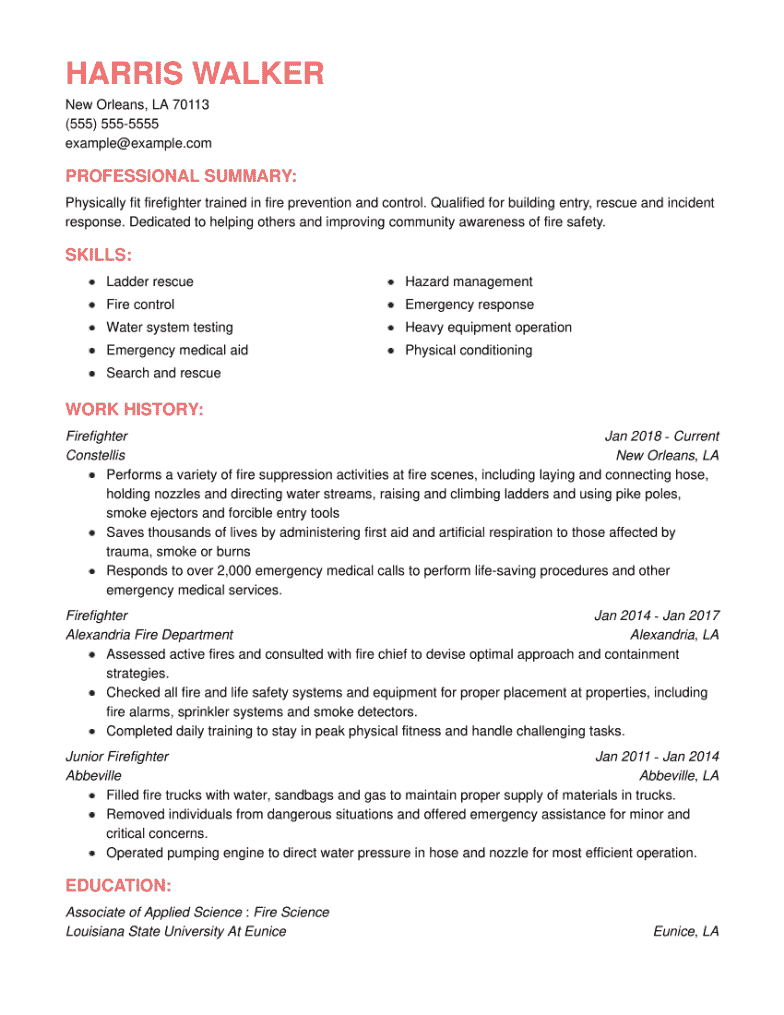Fantastic firefighter CV examples to use this year
Firefighters are responsible for the well-being of the public. Use our CV examples and tips to show that you’re ready for the challenge.
Firefighters are responsible for the well-being of the public. Use our CV examples and tips to show that you’re ready for the challenge.





OUR USERS HAVE BEEN HIRED BY

A firefighter protects the public from fires and other dangers. They are public servants who also need to educate people on fire safety and preventative measures.
A fantastic firefighter CV sample will therefore show you can perform the duties of the role. It will show you have the necessary certifications, first aid knowledge, and fire safety expertise to exceed while showing you have the skills required to respond effectively to emergency situations.
A professional CV for a firefighter will foster trust in you. It should demonstrate that you have the relevant knowledge while also portraying you as a reliable team player. Hiring managers are going to be looking for specific references to duties outlined in the job description.
Where possible, make sure you make specific references to things like firefighting equipment, knowledge of hazardous materials, and fire prevention throughout your skills and experience sections to firmly establish your credibility in the best CV possible.
In terms of CV format, the sections of your CV will be the same—header, professional summary or career objective, skills, work experience and education. It is how they’re organised that will depend on your CV format: chronological, functional and combination. Chronological CVs focus on employment history, functional CVs showcase skills, and combination CVs emphasise both.
The CV header section is a very important part of your CV and is typically the first thing a hiring manager will see. It should contain your full name and basic contact information. It is critical to make it as convenient as possible for the recruiter to contact you, so you should add your LinkedIn profile too.
The professional summary or career objective comes next. This should be short and concise, no longer than three sentences.
A professional summary is an overview of your career background and what you can bring to the fire department. Think of it as a tagline providing a snapshot view of your career highlights. A career objective, on the other hand, is a brief statement that communicates your career goals and what you want from a firefighter job.
Being a firefighter is an incredibly demanding, challenging role. To perform it well, you’ll need a combination of hard skills and soft skills. The skills section of your perfect CV should reflect this, listing a variety of prerequisite skills that demonstrate you are capable of meeting the challenge.
Choose from the bullet points for inspiration:
It is imperative to acknowledge the demands of the role in the skills section. In doing this, you show the recruiter you are fully aware of the challenge of being a firefighter but have the personality traits and knowledge to fulfil those demands.
List your previous relevant years of professional experience in reverse chronological order in your experience section. Briefly describe your responsibilities. Obviously, if you have experience as a firefighter, list your relevant duties.
However, if you’re an entry-level firefighter, there are still ways for you to gain experience. You can gain experience as a volunteer firefighter or work in a support role at an emergency call centre. You may have experience working as a first responder in an emergency response team or as a paramedic. These roles have transferable skills and show you to be familiar with this environment, even if you haven’t necessarily been a firefighter.
There are some general guidelines to follow for any CV:
You should always add a cover letter to your application. A cover letter can help provide more detail and a more personal touch. A cover letter should expand on your CV. Start with an intro that highlights your strengths and follow that up with why you’re a great fit for a role as a firefighter. Then end with a call to action. Take a look at our advice for an effective cover letter.
A firefighter’s CV should include any state certifications for firefighting and any other certificates you have as a first responder or a medical technician. However, if you don’t have these, you can still apply. There are many entry-level candidates for firefighting. Include skills that show you can fill the role, be part of a team, are physically fit, and can work well under pressure.
If you have experience as a volunteer firefighter, this should go into your experience section. Outline your duties within the role and include any training you took while in the role.
We personalize your experience.
We use cookies in our website to ensure we give you the best experience, get to know our users and deliver better marketing. For this purpose, we may share the information collected with third parties. By clicking “Allow cookies” you give us your consent to use all cookies. If you prefer to manage your cookies click on the “Manage cookies” link below.